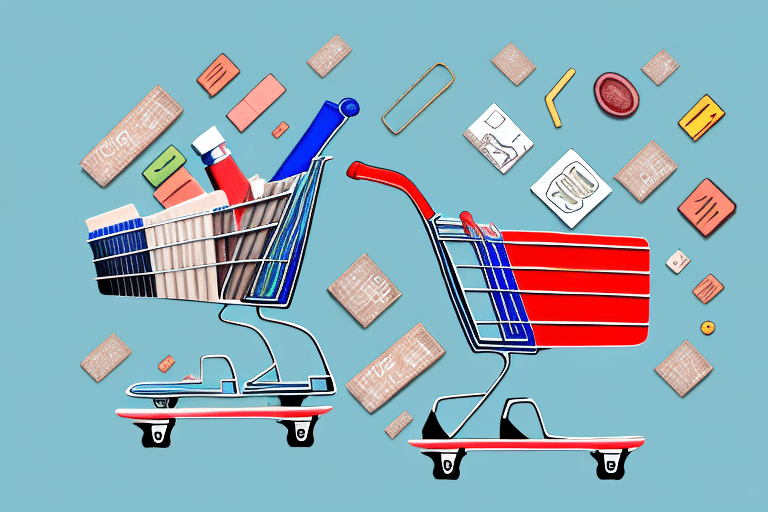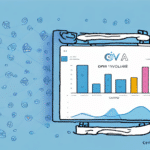13 Strategies to Increase Average Order Value and Boost Ecommerce Revenue
As an ecommerce business owner, one of your top priorities is likely to increase revenue. There are many strategies you can implement to achieve this goal, but one of the most effective ways is to focus on increasing your average order value (AOV). In this article, we will explore thirteen different techniques that you can use to boost your AOV and, in turn, your ecommerce revenue.
Understanding Average Order Value (AOV): What It Is and Why It Matters
Before diving into specific strategies, let's first define what AOV is and why it matters. Your AOV is the average amount of money that customers spend on your website per order. According to a Shopify report, increasing AOV by just a small percentage can significantly impact your overall revenue.
This metric is crucial because it is directly tied to your revenue—the higher your AOV, the more money you will make per transaction. Increasing AOV is often easier and more cost-effective than acquiring new customers, making it a great way to drive growth for your business.
Analyzing Your Current AOV and Identifying Opportunities for Improvement
The first step in increasing your AOV is to analyze your current data. Use analytics tools like Google Analytics to monitor your sales numbers and calculate your current AOV, providing a baseline to work from.
Identify High-Value Products and Customer Segments
Look for trends in your data:
- Are there certain products or categories that tend to have higher AOVs?
- Are there any customer segments that consistently spend more money?
Identifying these trends can help you focus on areas where you can make the most significant impact.
Optimize the User Experience
Analyze your website's user experience to identify any barriers in the checkout process that may be causing customers to abandon their carts or spend less than intended. Consider the following improvements:
- Simplify the checkout process
- Offer upsells or bundles
- Provide free shipping thresholds
Additionally, consider the timing and frequency of your promotions and discounts. While effective in driving sales, they can also lead to lower AOV if customers are only purchasing discounted items. Instead, offer promotions that incentivize customers to spend more, such as "Spend $100, get $20 off" or "Buy one, get one 50% off."
Offering Discounts vs. Upselling: Which Strategy Works Best?
Offering discounts or promotions is a common way to increase AOV. For example, you might offer a percentage discount on orders over a certain amount or give customers free shipping once they hit a specific spending threshold. However, it's essential to balance this with other strategies like upselling.
Upselling for Higher Profit Margins
Upselling involves encouraging customers to purchase more expensive or premium versions of the products they are already buying. This approach can be more profitable in the long run, as it allows you to increase AOV without sacrificing margin.
Best Practices for Upselling:
- Offer relevant and valuable upgrades
- Avoid pushing unnecessary products
- Enhance the customer's experience with meaningful additions
For more insights on effective upselling, refer to this BigCommerce guide.
Effective Cross-Selling Techniques to Boost AOV
Cross-selling is another excellent way to increase AOV. This involves recommending additional products that complement the items customers are already purchasing. For example, if someone is buying a new phone, you might suggest a protective case or a screen protector.
Bundle Deals
Offering bundle deals groups together complementary products at a discounted price. For instance, if someone is buying a new laptop, you might offer a bundle that includes a laptop bag and a wireless mouse at a special price. This not only increases the AOV but also provides added value to the customer.
Personalized Recommendations
Use data analytics to personalize product recommendations based on the customer's purchase history and browsing behavior. Personalized recommendations can significantly increase AOV by suggesting products that are most likely to interest the customer.
Tools like Shopify Product Recommendations can help automate this process.
The Power of Bundling: How to Encourage Customers to Spend More
Bundling involves grouping products together and offering them as a package deal. This strategy encourages customers to spend more than they might have otherwise. For example, if you sell skincare products, you might offer a "Nighttime Routine Bundle" that includes a cleanser, serum, and moisturizer.
Benefits of Bundling
- Increases perceived value
- Helps move slower-selling inventory
- Simplifies decision-making for customers
Offering discounts or special pricing on bundled packages can make this strategy even more effective.
Implementing a Loyalty Program to Drive Repeat Purchases and Higher AOV
A loyalty program encourages repeat purchases and increases AOV by rewarding customers for their continued business. This can take many forms, such as a points-based system where customers earn rewards for each purchase.
Benefits of Loyalty Programs
- Incentivizes customers to spend more
- Provides valuable customer data
- Enhances customer retention and loyalty
For instance, offering special perks like early access to sales or exclusive product releases can motivate customers to increase their spending. Regularly evaluating and updating your loyalty program ensures it remains effective and relevant.
Learn more about creating effective loyalty programs from this Shopify resource.
Using Personalization and Product Recommendations to Increase AOV
Personalization tailors the shopping experience to each customer based on their browsing and purchase history, increasing the likelihood of larger purchases. For example, if a customer frequently buys workout gear, you might recommend new workout apparel or related accessories.
Personalized Discounts and Promotions
Offer personalized discounts or promotions based on a customer's purchase history and behavior. This can incentivize larger purchases and enhance the overall shopping experience.
Ensuring a Positive Personalization Experience
Ensure that personalization strategies are not intrusive. Obtain customer consent and be transparent about data usage. Regularly update and refine your personalization tactics to stay aligned with customer preferences.
For more information on effective personalization, check out this OptiMonk guide.
Leveraging Social Proof and User-Generated Content to Build Trust and Drive Sales
Social proof, such as customer reviews and user-generated content, can significantly influence purchasing decisions and increase AOV. By showcasing positive reviews and customer testimonials on product pages, you build trust with potential customers.
Encouraging Social Media Engagement
Encourage customers to share photos and videos of themselves using your products on social media. This not only provides social proof but also fosters a sense of community around your brand.
Utilizing Customer Reviews
Highlighting customer reviews and ratings can reassure potential buyers and encourage them to make larger purchases. Integrate platforms like Trustpilot or Yotpo for managing and displaying reviews effectively.
Maximizing Mobile Sales: Tips for Increasing AOV on Mobile Devices
With the increasing use of mobile devices for online shopping, optimizing your mobile experience is crucial for increasing AOV. Ensure your website is mobile-friendly and that the checkout process is streamlined.
Optimize Mobile Checkout
Simplify the checkout process on mobile devices by minimizing the number of steps and ensuring that forms are easy to fill out. Consider implementing one-click purchasing options.
Personalized Mobile Promotions
Use machine learning algorithms to offer personalized product recommendations based on mobile browsing and purchase history. Additionally, offer mobile-specific promotions or discount codes to encourage larger transactions.
Improve Mobile Performance
Ensure your website loads quickly and is responsive on all mobile devices. Slow loading times can lead to frustration and cart abandonment.
For more tips on optimizing mobile sales, refer to this BigCommerce guide on mobile commerce.
Tracking Your Progress: Measuring the Success of Your AOV Strategies
Tracking and measuring the success of your AOV strategies is essential for understanding what works and what doesn't. Use analytics tools to monitor key metrics and adjust your strategies accordingly.
Key Metrics to Monitor
- Average Order Value (AOV): Track changes over time to see the impact of your strategies.
- Conversion Rate: Monitor how changes affect the rate at which visitors make purchases.
- Customer Lifetime Value (CLV): Understand the long-term value of customers gained through increased AOV.
Regularly reviewing these metrics allows you to refine your approaches and optimize for the best results.
Case Studies: Real-Life Examples of Companies That Increased Their AOV Successfully
Here are some real-life examples of companies that have successfully increased their AOV:
Example 1: Amazon's Recommendation Engine
Amazon uses sophisticated algorithms to suggest additional products during the shopping process, effectively increasing AOV by offering relevant items that complement the customer's current selection.
Example 2: Apple’s Product Bundling
Apple frequently offers product bundles, such as pairing an iPhone with accessories like cases and headphones at a discounted rate, encouraging customers to spend more.
Example 3: Sephora’s Loyalty Program
Sephora's Beauty Insider program rewards customers with points for every purchase, which can be redeemed for discounts or exclusive products, incentivizing higher spending.
Common Mistakes to Avoid When Trying to Increase AOV
While aiming to increase AOV, it's important to avoid common pitfalls that can harm your business:
- Over-Discounting: Excessive discounts can erode profit margins and devalue your products.
- Neglecting the Customer Experience: Focusing solely on increasing AOV without maintaining a positive customer experience can lead to dissatisfaction and reduced loyalty.
- Ignoring Data Insights: Failing to analyze and act on customer data can result in ineffective strategies.
- Short-Term Focus: Implementing strategies that prioritize immediate gains over long-term growth can be detrimental.
Ensure that your strategies are sustainable and aligned with your overall business goals.
Future Trends in Ecommerce Revenue Generation and How to Stay Ahead of the Game
Staying updated with the latest trends in ecommerce is essential for maintaining and increasing your AOV. Here are some upcoming trends to watch:
AI and Machine Learning
Artificial intelligence and machine learning will continue to play a significant role in personalizing the shopping experience, offering more accurate product recommendations, and automating upselling and cross-selling tactics.
Augmented Reality (AR)
AR technology allows customers to visualize products in their environment before purchasing, enhancing their confidence and potentially increasing AOV.
Sustainable and Ethical Shopping
Consumers are increasingly valuing sustainability and ethical practices. Offering eco-friendly products or transparent sourcing can attract customers willing to spend more for products aligned with their values.
Omnichannel Shopping Experiences
Providing a seamless experience across various channels—online, mobile, and in-store—can enhance customer satisfaction and encourage higher spending.
To stay ahead, keep an eye on industry reports from sources like Statista or Forrester, and be adaptable in implementing new technologies and strategies.
By implementing these thirteen strategies, you can increase your AOV and drive ecommerce revenue growth. Analyze your current data, leverage discounts and upselling, cross-sell effectively, bundle products, implement a loyalty program, use personalization and product recommendations, build trust with social proof, optimize for mobile, track your progress, learn from successful case studies, avoid common mistakes, and stay ahead by keeping up with industry trends. Good luck!




















